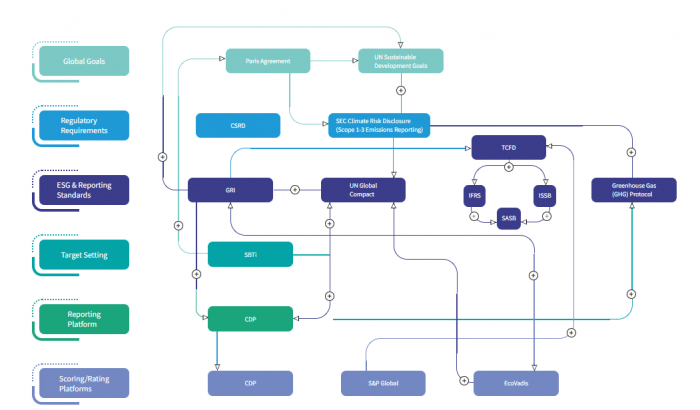Overview of the ESG Landscape

This visual aide shows the relationships and intersectionality between common ESG regulatory requirements, reporting frameworks, and global sustainability and climate goals. It is designed to help better understand the overall landscape as it relates to ESG, both domestically and internationally.
Self-Audit Checklist
Are you wondering what topics you need to cover to build your sustainability management system? Curious to know what documents should be included for each topic? Utilize SOCMA’s Sustainability Management System Self-Audit Checklist to help you get started!
Greenhouse Gas Emissions Inventory
Are you having trouble interpreting what falls under your scope 3 emissions? Check out Greenhouse Gas Protocol’s Technical Guidance for Calculating Scope 3 Emissions and then use the GHG Protocol Reporting Template to report your scope 3 emissions.
GRI Content Index
Create your own Global Reporting Index (GRI) content index using one of the templates in this document. The GRI content index templates include the revised GRI Universal Standards 2021 and the adapted GRI Topic Standards.
Anti-Corruption Policy
An Anti-Corruption Policy is a commitment to conducting activities in an ethical, transparent, and corruption-free manner. A policy will address process and procedures for preventing, addressing and reporting corruption.
Conflict Minerals Policy
A Conflict Minerals Policy affirms a company’s ethical sourcing and supply chain management practices.
ESG Policy
An ESG policy outlines a company’s commitment to ESG principles and approach to integrating them into a company’s decision-making processes and business activities.
External Privacy Policy
An External Privacy Policy outlines how a company uses information of its clients, consumers and website visitors.
Hazardous Waste Policy
A company’s Hazardous Waste Policy outlines the effective management of hazardous waste in compliance with all applicable laws and regulations.
Health & Safety Policy
A standard for all chemical manufacturers, this policy outlines a company’s commitment to promoting a culture of safety and providing guidelines to prevent accidents, injuries, and illnesses.
Human Rights Policy
A Human Rights Policy outlines a company commitment to respecting and protecting human rights.
Internal Privacy Policy
An Internal Privacy Policy is geared for employees and outlines how a company collects, uses, discloses, and protects the personal information of employees.
Non-Discrimination Policy
A Non-Discrimination Policy outlines a company’s commitment to fostering a diverse and inclusive environment for company agents.
Supplier Code of Conduct
This Supplier Code of Conduct sets forth the minimum standards and expectations that suppliers, are required to meet when doing business with your company.
Waste, Recycling and Circularity
This Waste, Recycling, and Circularity Policy outlines a company’s commitment to reducing waste, conserving resources, and minimizing environmental impact.
Waste Stewardship
This Water Stewardship Policy outlines a company’s commitment to the responsible use and conservation of water resources.
Whistleblower Policy
This Policy establishes procedures for reporting, investigating, and addressing such concerns and ensures protection against retaliation for whistleblowers.
